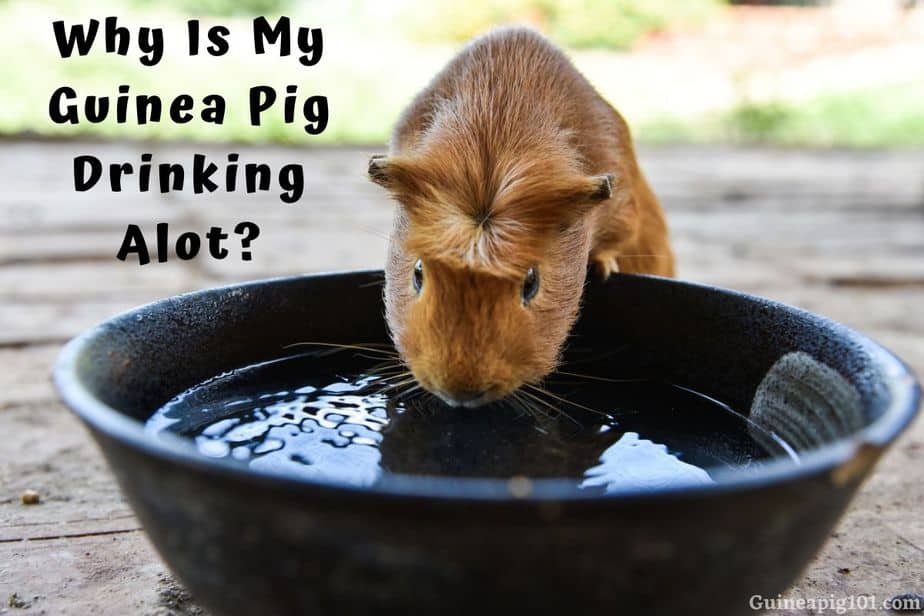If your guinea pig started drinking a lot of water all of a sudden, then it could be a valid concern. But what does it mean? Why is your guinea pig drinking so much? Are they ill? As a fellow owner, I had all these doubts in my mind as well. So, I did some research, and here is what I have learned.
In the summertime, guinea pigs tend to drink more water to keep themselves cool. Shedding a lot could also be the reason which increases their thirst. Apart from that, health concerns like diabetes, kidney problems, and dental issues can also lead to excessive water consumption in guinea pigs.
However, determining whether your guinea pig has some problem or are they drinking water normally would need some time and understanding of the issues.
Today, we will discuss in-depth about excessive thirst in guinea pigs, other symptoms, and problems accompanying the same. Finally, we will also look at what causes excessive thirst and what we can do about it.
How much should guinea pigs drink per day?
On average, a healthy guinea pig can drink anywhere between 50-300ml of water every day.
Now the consumption of water is dependent on a variety of factors, including the age, size, diet of your guinea pigs.
Apart from these seasonal factors, exercise, and lifestyle of your guinea pig also determine the consumption of water for your guinea pigs.
Most guinea pig owners are concerned about drinking when they compare the drinking habit of their one guinea pig with others.
Now, this may vary a lot. While one of your guinea pigs might be drinking 80 ml of water at the same time, your other guinea pig could be drinking over 150 ml of water.
What most owner thinks now is that either one of their guinea pig is drinking more water or the other one is drinking a lot less.
But both of the statement is incorrect. You must never compare the consumption of one guinea pig with another.
Instead, look at their particular consumption and see if one started drinking a lot more water suddenly then there is a matter of concern.
Is it bad if your guinea pig drinks a lot of water?

If your guinea pigs drink a lot of water from the very beginning, then it is entirely normal for them.
However, if your guinea pigs suddenly started drinking a lot more water than what they usually used to, then it is probably a warning sign.
The condition of excessive thirst in guinea pigs is also referred to as ‘Polydipsia.’
If you notice that your guinea pigs are drinking a lot more water or have signs of polydipsia, then you must look out for signs of other health problems in your guinea pigs.
Polydipsia or excessive thirst is not critical in itself, but you must look out for other symptoms in your guinea pigs.
Some of the most common signs you might notice alongside polydipsia are:
- Change in appetite
- Lethargy and Sluggish movement
- Fever
- Weight loss
- Diarrhea or frequent urination
- Signs of pain
- Aggression and other behavior changes
- Difficulty breathing
- Confusion
If you see any such signs alongside polydipsia then it means they are suffering from an underlying health problem.
What causes excessive thirst in guinea pigs?
There can be a lot of factors leading to excessive thirst in guinea pigs. We shall discuss about some common causes of polydipsia in guinea pigs. However, before that, you must keep somethings in mind.
If you are comparing the drinking habit of one guinea pig to another and then coming to the conclusion that your guinea pig is drinking too much water, then it is not the right method to follow.
Instead, you should closely monitor your guinea pig’s behavior. If at any point in time, you notice that their eating or drinking behavior has changed over some days, then it could be a matter of concern.
If you still think that your guinea pig is drinking too much water, then it’s time to investigate.
Here are eight major cause of excessive thirst in guinea pigs that you should look out for:
Dehydration
Although it may sound obvious, dehydration is often overlooked in guinea pigs.
The reason your guinea pig is drinking too much water is that they are thirsty.
Guinea pigs can easily get dehydrated due to various reasons, and under such circumstances, it is not unusual for them to drink too much water.
Some of the common causes include:
- Diarrhea
- water bottle nozzle is not working
- Water has some additive
- Change in their type of diet being served
Apart from these, there are some health issues as well that can cause dehydration in guinea pigs.
If you are unsure why your guinea pig is dehydrated, then it is recommended to take them to a vet.
Change in diet

Change is the diet of your guinea pigs could be one of the major problems leading to polydipsia in them.
A severe change in the diet can trigger diarrhea, which can also lead to the loss of essential electrolytes from their body.
Apart from that, an improper diet could also be the reason behind excessive thirst in guinea pigs.
In terms of excessive thirst, there could be two main reasons behind the same:
- Lack of vegetables in diet: Guinea pigs are fussy eater, but they do get a significant part of their water needs from their veggies. Although hay is the staple part of your guinea pig’s diet, they also need a cup of fresh veggies daily to keep their digestive system well-balanced. A lack of vegetables in their diet can trigger excessive thirst in your guinea pigs.
- Salt in diet: Adding excess salt to your guinea pig’s diet can lead to dehydration in your guinea pigs. Salt can absorb water from the cells, leaving them completely dehydrated. This can cause dehydration in your guinea pigs.
You should serve the right balance of vegetables in your guinea pig’s diet.
Also remember that guinea pigs don’t require salt licks, so if you have added the same in their cage, then you must remove the them immediately.
Overheating
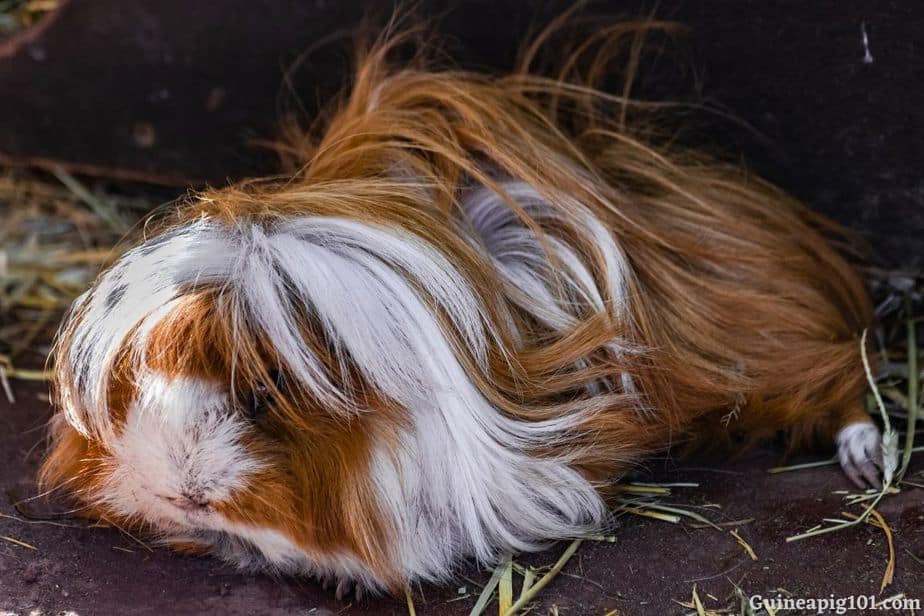
A rise in temperature is uncomfortable for us, and the same applies to our guinea pigs as well.
Guinea pigs cannot tolerate summer heat very well. They need a stable environment to live healthily.
Thus, it is quite apparent that summer heat can overheat your guinea pigs rather quickly as they have their thick fur coat.
As we tend to drink more water in summer because our body loses moisture in the form of sweat during summer.
However, guinea pigs don’t sweat, so why do they need more water? The answer is quite simple.
Cool water helps them in maintaining their body temperature. It helps them cool their body temperature internally.
However, sometimes your guinea pigs might overheat, and that can be life-threatening for them.
Thus, you must look out for signs of overheat alongside polydipsia in your guinea pigs. Some of the common signs include:
- Hot or red ear
- Lying with their body stressed out
- Lethargy
- A wet nose
- Breathing with mouth open
- Hiding in their hideout
Overheating can be deadly; thus, you must provide some relief to your guinea pigs.
Some common ideas to go for includes: misting of cold water, placing a chilled bottle wrapped in some towel or fleece, etc.
You can learn more about how to keep your guinea pigs cool in summer from our in-depth article.
Severe pain

Guinea pigs are prey animals, and they do their best to hide their pain and illness.
This behavior helps them survive and avoid becoming an easy target of the predators.
However, it also brings a challenge for their owners as determining if your guinea pig is in pain or ill becomes difficult.
Still, there is some typical behavior to look out for that can help you understand their problem.
Change in eating and drinking habit is one common reason.
If you notice your guinea pig is not eating properly or drinking a lot of water, then it could be a sign of an underlying health condition.
Some of the common cause of pain includes:
- Dental issues: Some common example includes, rotten teeth, malocclusion, and overgrown teeth.
- Bumblefoot: Raw patches of skin that develop at the bottom of their feet.
- Gastrointestinal problems: For example bloating, stomach upset, etc.
- Surgery: Drinking a lot of water after surgery is a common phenomenon.
There can be many other factors leading to pain. Visit a veterinarian for proper examination. You can also learn more about what causes pain in guinea pigs and what should you do if your guinea pig is in pain from our in-depth article on the same.
Urinary tract problems
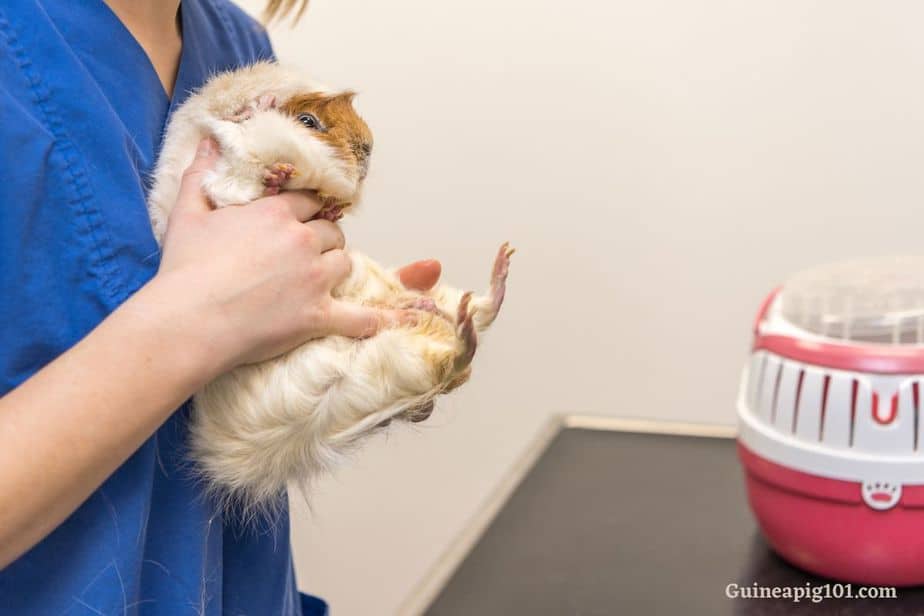
Urinary tract problems are common in guinea pigs. It can be caused either by a poor diet, uncleaned living environment, or a lot of other factors.
Some of the common Urinary tract problems include Urinary tract infection, bladder stone, sludge, etc.
Although excess thirst is not a direct symptom of urinary tract problems, but if your guinea pig is suffering from these problems, then they could end up consuming more water to ease out their pain and symptoms. Learn more in-depth How Do You Treat A UTI In Guinea Pigs?
You can learn more about these problems from our articles:
Diabetes
Diabetes is a common disease in guinea pigs, especially when they are obese.
Often guinea pig owners don’t understand the dietary needs of their guinea pigs and end up feeding them too much treat that can result in obesity and diabetes.
Guinea pigs can be diabetic by birth. However, this is a rare occurrence. In most cases, an unbalanced diet leads to diabetes in guinea pigs.
Some of the common symptoms of diabetes include Excessive thirst, increase in appetite, frequent urination, etc.
A guinea pig suffering from diabetes will need immediate medical attention. You must also change their diet and switch them to a healthy one.
Digestive problems
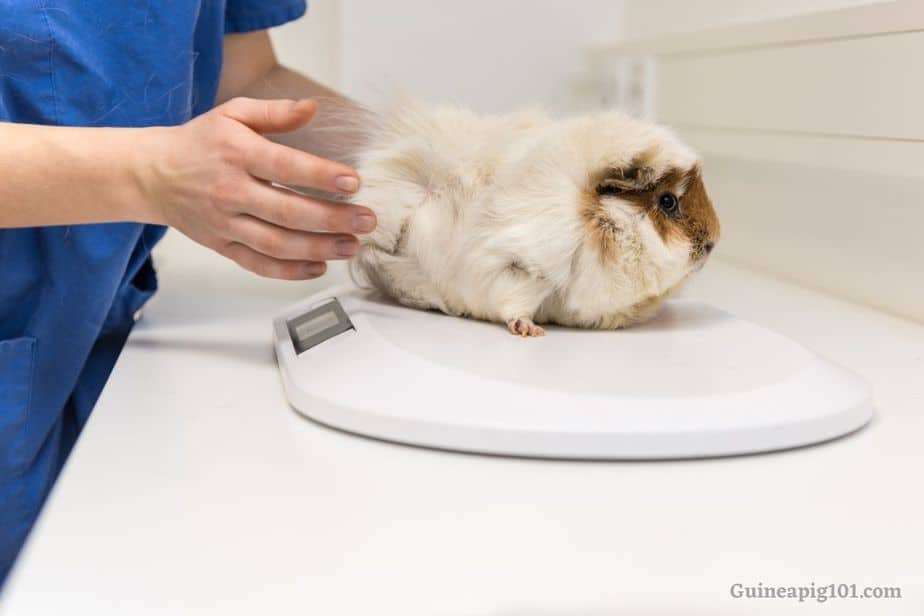
Digestive problems, including diarrhea, bloating, etc. could have a direct impact on the consumption of food and water of your guinea pigs.
Your guinea pigs will lose electrolytes quickly and thus need to drink more water if they are suffering from such problems.
While digestive issues could get fatal sometimes, it is generally a mild problem that can get treated with some extra care and proper diet.
Some of the symptoms to look out for are:
- Weight loss
- Loss of appetite
- Lethargy
- Depression
- Unable to move or confusion
If you notice such symptoms in your guinea pigs with polydipsia, then you must consult a vet. Your guinea pig’s health could deteriorate in no time if we don’t pay attention to the same.
Behavioral causes
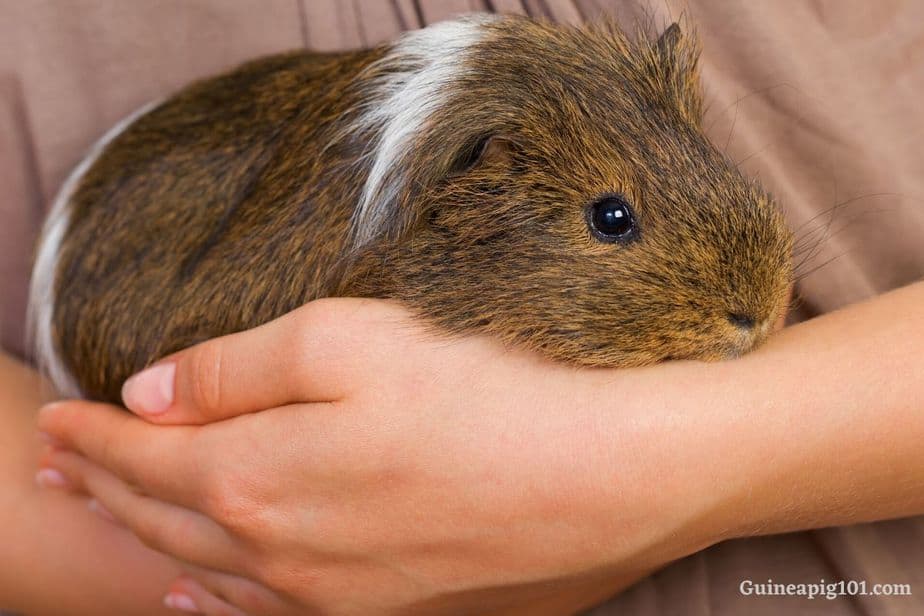
If none of the above is the cause of excessive thirst in your guinea pigs, then there is a possibility that nothing is wrong medically with your guinea pigs.
However, they could have developed the habit of drinking excess water out of boredom or lack of mental stimulation.
Guinea pigs are smart and active animals, and a lack of mental stimulation can make them depressed.
This can also possibly be the reason behind excessive thirst in your guinea pigs.
Anxiety and stress could also be a factor that can trigger excessive thirst in guinea pigs.
However, before concluding, you must get your guinea pigs examined by a veterinarian.
As sometimes, there are some medical problems that we could not investigate apparently, but a thorough examination from the vet could determine the same.
Treatment of excessive thirst in guinea pigs
If your guinea pig is drinking too much, then your priority should be determining the cause of the same.
Start by examining your guinea pig’s diet first.
Are they eating the right amount of hay and vegetables? How many treats have you been offering? Did you make any significant changes in their diet?
Try making small and simple changes in their diet and note down the effects of the same.
Once done with the diet now come to their living environment. Pay attention to temperature and living conditions.
Is the house well ventilated? Are their cage placed near a window that allows direct sunlight?
Consider moving their cage to the central part of your home. Preferably at a cooler location.
Monitor your guinea pig’s health for a few days. Also, check their water consumption daily.
You can mark their bottle with a marker and see how much water they are consuming on a daily basis.
Don’t restrict their supply of food and water. However, do track their consumptions.
Meanwhile, you could be looking out for other health problems in your guinea pigs. These could be an indicator of a significant health issue:
- Change in drinking habits
- Change in appetite
- Weight loss
- Lethargy
- Diarrhea or constipation
- Not urinating or defecating
If you notice any of these symptoms in your guinea pigs, then rush them to a vet immediately.
They can accurately diagnose your guinea pigs to find the cause.
Once diagnosed, you can treat your guinea pig for the specific problem, as suggested by the vet.
Learn in-details How To Treat Guinea Pig Constipation?
Source: The physiological society, American Journal, Cambridge core, A Very Thirsty Guinea Pig, GUINEA PIG GENERAL CARE GUIDE, Drinking preferences in guinea pigs, Guinea pig (Cavia porcellus) drinking
